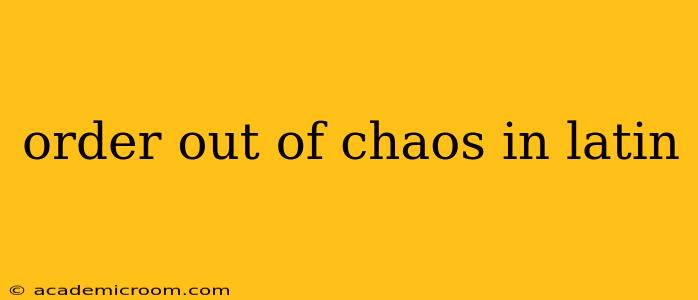Order Out of Chaos: Exploring the Latin Phrase "Ex nihilo nihil fit" and its Modern Applications
The concept of creating order from chaos is a timeless one, resonating across cultures and philosophies. While there isn't a single perfect Latin phrase that directly translates to "order out of chaos," "ex nihilo nihil fit" comes closest in capturing the essence of the idea, albeit from a slightly different angle. This phrase, meaning "nothing comes from nothing," highlights the principle that creation requires pre-existing materials or forces. However, the process of transforming disorder into order – a process vital in many aspects of life – is deeply connected to this fundamental principle.
This article will explore the nuances of "ex nihilo nihil fit" and related Latin phrases, examining their historical context and how they apply to modern interpretations of order arising from chaos. We'll also delve into frequently asked questions surrounding this concept.
What does "ex nihilo nihil fit" actually mean?
"Ex nihilo nihil fit" literally translates to "from nothing, nothing comes." This philosophical principle, attributed to Lucretius and other ancient thinkers, suggests that creation isn't about conjuring something from absolute nothingness. Instead, it involves the rearrangement, transformation, or combination of pre-existing elements. This resonates with scientific principles of conservation of mass and energy – nothing is truly created or destroyed, only changed in form.
What are some other Latin phrases related to order from chaos?
While "ex nihilo nihil fit" focuses on the impossibility of creation from absolute nothingness, other Latin phrases better encapsulate the active process of bringing order from chaos. Although not a direct translation, "ordo ab chao" ("order from chaos") is frequently used in this context and more directly reflects the desired meaning. Other relevant phrases might include:
- "A Deo omnia": From God, all things. This implies a divine ordering principle, with chaos ultimately yielding to a higher power's design.
- "Invenire viam aut facere": Find a way or make one. This emphasizes the proactive role in creating order, even in the face of apparent chaos.
How does the concept of "order out of chaos" apply to modern life?
The principle of finding order amidst chaos finds applications across numerous fields:
- Project Management: Successfully managing a project often involves navigating unexpected hurdles and setbacks. The ability to adapt, prioritize, and find efficient solutions amidst complexity is crucial.
- Business: Economic downturns, market fluctuations, and competitive pressures create chaotic environments. Businesses that thrive are those that can adapt, innovate, and find order within these challenges.
- Personal Development: Life inevitably presents unforeseen difficulties and stressful situations. The ability to find structure, prioritize tasks, and maintain a sense of calm amidst chaos is essential for personal well-being.
- Science: Scientific discovery often involves tackling complex, seemingly chaotic data. The process of organizing, analyzing, and interpreting this data leads to breakthroughs and a better understanding of the world.
Is it always possible to achieve order out of chaos?
This is a complex question. While the ideal of perfect order from chaos might be unattainable in some cases, the process of striving for order is itself valuable. It encourages problem-solving, adaptability, and resilience. Even partial success in establishing order can lead to significant improvements and positive outcomes. The key is to focus on progress, not perfection.
How can I apply the principle of order out of chaos in my own life?
Applying this principle involves developing strategies for coping with uncertainty and establishing structure:
- Prioritization: Identify key tasks and objectives, focusing on the most important aspects first.
- Planning: Develop strategies and contingency plans to address potential challenges.
- Mindfulness: Cultivate a sense of calm and perspective to manage stress and maintain focus.
- Adaptability: Be prepared to adjust plans as needed and embrace change.
In conclusion, while "ex nihilo nihil fit" emphasizes the impossibility of creating something from absolute nothing, the concept of "order out of chaos" highlights the vital process of transforming existing elements into something organized and meaningful. This principle is applicable across various aspects of life, from personal challenges to complex organizational projects. The ability to find structure and order in the face of adversity is a valuable skill that leads to resilience, growth, and success.
